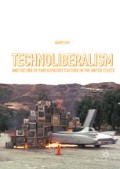Abstract
The video producers investigated here collectively challenge the socio-technical means of their professional livelihood through guerilla technological practices and policy oppositional models. They are not just broadcasters, pundits, television hosts, or behind-the-scenes waged producers. They are not just activists, seeking social justice for others. They are both broadcasters and media reformers who reform the technological and political conditions for their broadcasts. They dialogue on their future in meetings, panels, and in semi-private conversations. Their mission is how to achieve public goals such as improved democratic dialogue on private media systems while making a living. Throughout their history, video producers have modified their broadcasting approaches, how they addressed the public, and what reformist model they drew from in these pursuits.
Access this chapter
Tax calculation will be finalised at checkout
Purchases are for personal use only
References
Adorno, T.W., and M. Horkheimer. 1977. The Culture Industry: Enlightenment as Mass Deception. In Mass Communication and Society, ed. J. Curran, M. Gurevitch, and J. Woollacott, 349–383. London: The Open University Press.
Alterman, E. 2003. What Liberal Media? The Truth about Bias and the News. New York: Basic Books.
Anderson, C. 2006. The Long Tail: Why the Future of Business Is Selling Less of More. New York: Hyperion.
Ang, I. 1991. Desperately Seeking the Audience. London: Routledge.
Artz, B.L. 2000. Introduction. In Public Broadcasting and the Public Interest, ed. Michael P. McCauley, Eric E. Peterson, B. Lee Artz, and DeeDee Halleck. Armouk, NY: M.E. Sharpe.
Bagdikian, B. 1983. The Media Monopoly. New York: Beacon Press.
Clark, A. 2012. Can Current TV Establish Itself as a Real Competitor in Political Broadcasting Without Keith Olbermann? Alternet. Accessed December 5, 2015. http://www.alternet.org/news/154135/can_current_tv_establish_itself_as_a_real_competitor_in_political_broadcast–with_or_without_keith_olbermann
Couldry, N. 2010. Why Voice Matters: Culture and Politics After Neoliberalism. London: Sage.
Dana, R. 2012. Gore’s Desperate Bid to Keep Keith Olbermann—And Save Current TV. The DailyBeast/Newsweek. Accessed March 20, 2012. http://www.thedailybeast.com/newsweek/2012/02/05/iskeith-olbermann-the-last-hope-for-gore-s-current-tv.html
Eggerton, J. 2008. Obama Does Not Support Return of Fairness Doctrine. Broadcasting & Cable. Accessed March 20, 2012. http://www.broadcastingcable.com/article/114322-Obama_Does_Not_Support_Return_of_Fairness_Doctrine.php
Ferguson, J., and A. Gupta. 2002. Spatializing States: Towards an Ethnography of Neoliberal Governmentality. American Ethnologist 29(4): 981–1002.
Fish, A. 2005. Native American Places and the Language of Capitalism. Future Anteriors: The Journal of Historic Preservation, History, Theory, and Criticism 2(1): 40–49.
Fish, A., L.F.R. Murillo, L. Nguyen, A. Panofsky, and C. Kelty. 2011. Birds of the Internet: A Field Guide to Understanding Action, Organization, and the Governance of Participation. The Journal of Cultural Economy 4(2): 157–187.
Foucault, M. 1991. Governmentality. In The Foucault Effect: Studies in Governmentality, ed. Graham Burchell, Colin Gordon, and Peter Miller. Chicago: University of Chicago Press.
Fowler, M., and D. Brener. 1982. A Marketplace Approach to Broadcast Regulation. Texas Law Review 60(2): 207–257.
Genachowski, J. 2011. Chairman Genachowski’s Response to Rep. Upton and Rep. Walden. 24 June. Accessed March 20, 2012. http://hraunfoss.fcc.gov/edocs_public/attachmatch/DOC-308274A1.pdf
Gore, A. 2007. The Assault on Reason. London: Penguin Press.
Halleck, D.D. 2002. Hand Held Visions: The Impossible Possibilities of Community Media. New York: Fordham University Press.
Halpin, J., J. Heidbreder, M. Lloyd, P. Woodhull, B. Scott, J. Silver, and S. Derek Turner. 2007. The Structural Imbalance of Political Talk Radio. Center for American Progress. Accessed March 20, 2012. http://www.americanprogress.org/issues/2007/06/talk_radio.html
Jansen, S.C. 2011. Media, Democracy, Human Rights, and Social Justice. In Media and Social Justice, ed. Sue Currey Jansen, Jefferson Pooley, and Lora-Taub Pervizpour. New York: Palgrave Macmillan.
Mamoun, L. 2003. Wielding Weapons of Mass Persuasion: The Anti-war TV Movement. Z Magazine. Accessed March 20, 2012. http://www.zcommunications.org/wielding-weapons-of-mass-persuasionby-linda-mamoun
McCauley, M.P., E.E. Peterson, B.L. Artz, and D.D. Halleck. 2003. Introduction. In Public Broadcasting and the Public Interest, ed. M.P. McCauley, E.E. Peterson, B.L. Artz, and D.D. Halleck. Armouk, NY: M.E. Sharpe.
McChesney, R. 2003. Public Broadcasting: Past, Present, and Future. In Public Broadcasting and the Public Interest, ed. M.P. McCauley, E.E. Peterson, B.L. Artz, and D.D. Halleck. Armouk, NY: M.E. Sharpe.
McChesney, R., and J. Nichols. 2010. The Death and Life of American Journalism: The Media Revolution That Will Begin the World Again. New York: Nation Books.
Morozov, E. 2011. The Net Delusion: The Dark Side of Internet Freedom. Jackson, TN: Public Affairs Books.
Ostrow, J. 2011. ‘Anti-Fox’ Free Speech TV Wants a Spot on Comcast. Denver Post. Accessed March 20, 2012. http://www.denverpost.com/ci_17993536?source=bb
Public Mind Poll. 2011. Some News Leaves People Knowing Less. Public Mind Poll. Accessed March 20, 2012. http://publicmind.fdu.edu/2011/knowless/
Schiller, D. 1999. Social Movement in Telecommunications: Rethinking the Public Service History of U.S. Telecommunications, 1804–1919. In Communication, Citizenship, and Social Policy, ed. A. Calabrese and J.C. Burgelman, 137–155. Lanham, MD: Rowman & Littlefield.
Streeter, T. 1996. Selling the Air: A Critique of the Policy of Commercial Broadcasting in the United States. Chicago: University of Chicago Press.
Wu, T. 2010. The Master Switch: The Rise and Fall of Information Empires. New York: Knopf.
Author information
Authors and Affiliations
Rights and permissions
Copyright information
© 2017 The Author(s)
About this chapter
Cite this chapter
Fish, A. (2017). Liberalism and Broadcast Politics. In: Technoliberalism and the End of Participatory Culture in the United States. Palgrave Macmillan, Cham. https://doi.org/10.1007/978-3-319-31256-9_3
Download citation
DOI: https://doi.org/10.1007/978-3-319-31256-9_3
Published:
Publisher Name: Palgrave Macmillan, Cham
Print ISBN: 978-3-319-31255-2
Online ISBN: 978-3-319-31256-9
eBook Packages: Literature, Cultural and Media StudiesLiterature, Cultural and Media Studies (R0)

